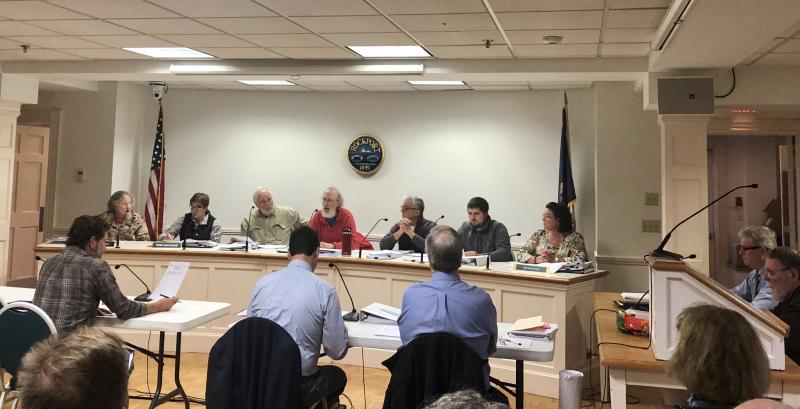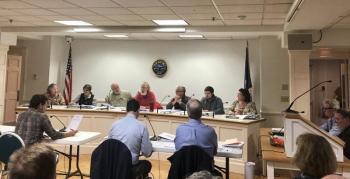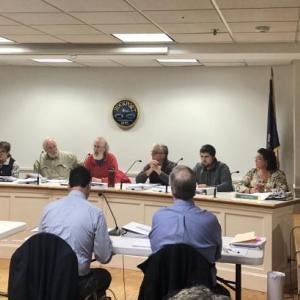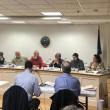Rockport Zoning Board of Appeals upholds building permit for new library
 The Rockport Zoning Board of Appeals at its Oct. 17 hearing of the Stephen Earle appeal of a library building permit issued by the town to itself on May 22. From left to right: Emily Lusher, Terri Mckenzie, David Cockey, Chairman Geoff Parker, Kevin Olehnik, Tom Kennedy and Kim Graffam. (Photo by Lynda Clancy)
The Rockport Zoning Board of Appeals at its Oct. 17 hearing of the Stephen Earle appeal of a library building permit issued by the town to itself on May 22. From left to right: Emily Lusher, Terri Mckenzie, David Cockey, Chairman Geoff Parker, Kevin Olehnik, Tom Kennedy and Kim Graffam. (Photo by Lynda Clancy)
 The Rockport Zoning Board of Appeals at its Oct. 17 hearing of the Stephen Earle appeal of a library building permit issued by the town to itself on May 22. From left to right: Emily Lusher, Terri Mckenzie, David Cockey, Chairman Geoff Parker, Kevin Olehnik, Tom Kennedy and Kim Graffam. (Photo by Lynda Clancy)
The Rockport Zoning Board of Appeals at its Oct. 17 hearing of the Stephen Earle appeal of a library building permit issued by the town to itself on May 22. From left to right: Emily Lusher, Terri Mckenzie, David Cockey, Chairman Geoff Parker, Kevin Olehnik, Tom Kennedy and Kim Graffam. (Photo by Lynda Clancy)
ROCKPORT — The Rockport Zoning Board of Appeals spent more than 4.5 hours Oct. 17 debating, poring over the Land Use Ordinance, verifying definitions and interpreting intent of those who originally wrote the town’s land use ordinance. Ultimately, they voted unanimously to uphold the town’s issuance of a building permit it granted itself to build a new 10,000 square foot library in Rockport Village.
At the same time, the board, consisting of seven volunteer citizens acting in a quasi judicial capacity, agreed that the language used in town’s current land use ordinance is vague in some sections and requires attention.
The appeal under consideration had been filed in June by Stephen Earle, an immediate neighbor to the property where the town is now building a new municipal library. Earle had disputed the issuance by the Rockport Code Enforcement Office of a May 22 building permit, saying Rockport failed to satisfy multiple performance standards as laid out in the town’s land use ordinance, including those concerning landscaping and architecture.
Furthermore, Earle contended that the town should have sent the permit application to the Planning Board for site plan review, instead of sending the application to the Rockport Code Enforcement Officer for review and approval.
By meeting’s end, at 10:10 p.m., ZBA member Kim Graffam, proposed the deciding motion, saying, “The ZBA denies the appeal as presented and authorizes the code enforcement officer to issue the building permit.”
All seven members vote unanimously in favor of the motion.
While the appeal had been moving through the municipal process, contractors have continued to build at 1 Limerock Street, the location where Rockport’s old library, since torn down, had been since 1949. While the ZBA has upheld the permit issuance, the appellant still has legal recourse, if he wants to appeal the ZBA’s decision in Knox Country Superior Court.
He has 30 days to do so.
But the ZBA hearing gave the town a chance to publicly and formally air and debate many of the grievances about the new library siting, design and engineering that have been percolating since last winter.
And the debate amongst ZBA board members themselves through the Oct. 17 hearing reflected their own intense focus on the land use ordinance and their responsibility to produce their own findings of fact, not only for the town’s sake, but if the matter should move to court, they have substantiated their reasoning.
They muscled through a list of review criteria, casting formal votes on findings, not always unanimously, but with enough consistency to uphold the permit.
As their attorney William Kelly advised them Oct. 17, their record of deliberations was useful but, “a punchline is important, so make motions.”
The Oct. 17 hearing began at 5:30 p.m. in the Geoffrey C. Parker Meeting Room at the Rockport Opera House, a continuation from the Sept. 11 hearing, when the ZBA heard from Earle, who contested whether the town properly processed the town’s own building application. Read: Rockport Zoning Board of Appeals seeks clarity as it considers library permit
The Oct. 17 meeting was streamed at https://livestream.com/Rockportmaine/events/8841363
Earle, who lives adjacent to the lot where the town’s new $3.5 million-plus library is under construction, had asked whether the town should have directed its Planning Board to review the new library building plans, instead of sending the application to the Rockport Code Enforcement Officer for processing and approval.
The ZBA picked up the matter again Thursday evening, with a “roadmap” supplied by its advisory attorney, William Kelly. The ZBA, consisting of Emily Lusher, Terri Mckenzie, David Cockey, Chairman Geoff Parker, Kevin Olehnik, Tom Kennedy and Graffam, began picking through a list of findings of fact, ranging from stating that the Earle appeal had been received by the town within requisite timeframe to voting that the library building is not a commercial entity.
That particular discussion took up a good portion of the meeting, with consultations to the definition of commercial, the use of the term “nonresidential” in the ordinance, and finally the unanimous vote confirming that the library was not a commercial entity.
This was the “core issue” according to Kelly.
In the ordinance, commercial is defined as: “The nonresidential use of lands, buildings, or structures, other than a ‘home occupation,’ defined below, the intent and result of which activity is the production of income from the buying and selling of goods and/or services, exclusive of rental of residential buildings and/or dwelling units.”
But within that debate over commercial, the ZBA contended with the definition of ‘nonresidential’ and whether that definition followed directly as a semantic substitution of commercial, or included municipal and public building use.
Because the board ultimately decided that the library is not commercial, it therefore did not require site plan review by the planning board.
Then the board debated whether the project required adherence to the standards outlined in the land use ordinance governing commercial or nonresidential development, and there was subsequent agreement that the code enforcement officer would screen projects through that list of standards, even if a development was not required to undergo site plan review by the planning board.
Event Date
Address
United States

























